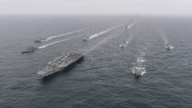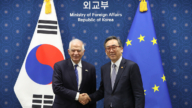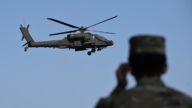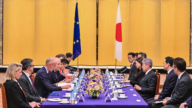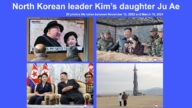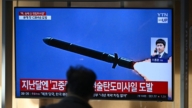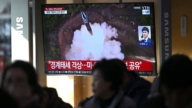【新唐人2013年05月09日訊】7號,中國銀行發表聲明說,已向「朝鮮外貿銀行」發出關閉帳戶通知,並停止接受該帳戶的資金轉帳業務。外界解讀認為,大陸當局出於國際壓力而對朝鮮做出制裁姿態。但因為中朝之間千絲萬縷的關係,雙方還是會繼續互相利用,中共對朝政策很難有大的改變。下面請看報導。
今年2月12號,朝鮮不顧聯合國決議和國際社會反對,進行了第三次核試驗。之後,朝鮮更威脅將對外發動戰爭。這讓朝鮮半島局勢快速升溫、緊張異常。
3月7號,聯合國安理會一致通過第2094號決議,決定加強對朝鮮的制裁力度,尤其是在金融領域和嫌疑貨物檢查方面。當時,一向力挺朝鮮獨裁政權的中共投了贊成票。
隨後,美國宣佈對「朝鮮外貿銀行」進行制裁,禁止美國機構或個人與該行進行任何交易。原因是「朝鮮外貿銀行」向朝鮮的核武器和彈道導彈項目提供資金支持。4月,日本也作出相應制裁。
目前,正值美國勸說歐盟制裁「朝鮮外貿銀行」的時刻,中國銀行罕見的高調宣佈參與制裁,這引來外界的關注。
香港城市大學政治學教授鄭宇碩分析,朝鮮頻頻利用核武器及導彈來威脅國際社會,讓中共備受國際壓力,同時中共對朝鮮的影響力也受到質疑,因此中共此舉一方面是表達對朝鮮的不滿,另一方面也是為了做樣子給國際社會、給美國看。
香港城市大學政治學教授鄭宇碩:「國內一般人對北京對朝鮮的政策表示失望。北京這麼多年支持朝鮮,結果對朝鮮一點影響力都沒有,北京主導的六方會談現在也差不多破產了。」
北京時政觀察人士華頗也指出,從賬面上有目共睹,中國大陸是朝鮮最大的經濟援助國。
北京時政觀察人士華頗:「這個也是表面文章。因為它關閉的帳號都是些公開的帳號。美國等國際社會基本都知道。既然中國在聯合國已經舉了手了,所以你還讓這些帳號正常的運行,顯然說不過去。」
香港《經濟日報》報導,2009年6月,時任中共總書記的胡錦濤主持召開中央外事工作領導小組會議,重新檢討對朝政策。最後經過激烈辯論,得出的結論為6個字:「不戰、不亂、無核」。
中共新任領導人習近平上臺後,曾對朝鮮提出批評,因此外界開始猜測:是否習近平、李克強會改變對朝政策?
對此,華頗指出,雖然習、李並不是親朝派,對朝鮮並無好感,甚至懷疑朝鮮曾深深涉入「薄熙來案」,但華頗認為:中共不會因此拋棄朝鮮。
華頗:「尤其這次朝鮮第三次核試驗,雖然中國也是表面舉手同意制裁,但是有一點,朝鮮第三次核試驗,從某種意義上講是幫助了中國(中共)。」
華頗分析,中共在南海爭端等問題上受制於美國,但又不敢撕破臉面。因此朝鮮對美國的挑戰正是中共所樂見,這樣中共就有了和美國討價還價的本錢。
4月22號,中共軍隊總參謀長房峰輝在與美軍參謀長聯席會議主席鄧普西會面後表示,朝鮮有可能進行第四次核試驗。
華頗:「會談的時候就威脅美國說:朝鮮可能還有第四次核試驗,中國願意幫忙去做朝鮮的工作等等。但是話裡話外有一句,中國不會白幫美國的忙。」
華頗強調,中、朝關係很微妙,雙方有矛盾、也有合作,但不管怎樣,中共不會拋棄朝鮮。對朝鮮的制裁,只是中共所做的表面文章。
採訪/易如 編輯/李謙 後製/蕭宇
Are China’s Sanctions on North Korea Superficial?
On May 7, Bank of China declared that it will close the
bank accounts of Foreign Trade Bank of North Korea.
It will disable its fund transferals.
Political analysts say that under international pressure,
the Chinese Communist Party(CCP) authorities
have to ostensibly impose sanctions against N. Korea.
The two sides still maintain a complicated relationship,
and will continue to take advantage of each other.
The analysts believe that the CCP’s North Korea
policy won’t see big changes in the near future.
In February this year, North Korea conducted
it’s third nuclear test amidst international outcry.
Afterwards, Pyongyang threatened
to spark off a war externally.
This has intensified the situation on the Korean Peninsula.
On March 7, the UN Security Council
unanimously adopted resolution 2094.
It strengthens N. Korea sanctions, especially financial
transactions and inspecting suspicious cargoes.
The CCP authorities, a long-term ally of
Pyongyang, voted in favor of the sanction.
Later, the US announced sanctions against
the Foreign Trade Bank of North Korea.
It stopped business transactions with the bank.
The bank has reportedly financed Pyongyang’s
nuclear weapons and ballistic missile programs.
In April, Japan passed sanctions against N. Korea.
The US is now persuading the
EU to join the ranks of sanctions.
Bank of China’s high-profile participation
has attracted world attention.
Joseph Yu-shek Cheng, professor of politics
at City University of Hong Kong, commented.
North Korea has repeatedly used nuclear weapons
and missiles to threaten the international community.
This has brought international pressure to the CCP.
Meanwhile, the CCP’s influence on
Pyongyang has come under question.
Prof. Cheng says that the CCP’s action
shows discontentment towards Pyongyang.
In addition, it shows that it just plays to
pressure from the international community.
Joseph Yu-shek Cheng:"Beijing’s policy toward
N. Korea has let down the general public in China.
The Beijing regime has backed Pyongyang
all these years, but has little influence with it.
By now, Beijing-led six-party talks have nearly failed."
Political observer Hua Po says that public financial data
shows China is North Korea’s largest source of financial aid.
Hua Po:"This is also a superficial act.
The bank accounts it closed are all
those that had been exposed to public.
Since the CCP has voted for the UN sanction, it cannot
justify permitting the operation of these bank accounts."
Hong Kong Economic Times reported about a
central leaders meeting that took place in June 2009.
The then CCP leader Hu Jintao reviewed N. Korea policies.
After heated debates, the policy was
finalized as “No war, No chaos, No nuclear".
The CCP new leader Xi Jinping has criticized Pyongyang.
This has sparked speculations on whether Xi-Li
would change the CCP’s policy on N. Korea.
Hua Po interprets that Xi-Li are not pro-Pyongyang.
They even have suspected that N. Korea
was deeply involved in Bo Xilai’s case.
Yet, this won’t make the CCP abandon N. Korea, he says.
Hua Po: “On the surface, China voted for the
sanction against N. Korea’s third nuclear test.
But this test, in a sense, has helped China’s authorities."
Hua Po explains that on some issues, such as South
China Sea disputes, the CCP has been subject to the US.
However, the CCP dares not to offend the US openly.
Pyongyang’s provocations against the
US is what the CCP would like to see.
It gives the CCP a bargaining power
against the U.S., says Hua Po.
On April 22, Fang Fenghui, Chief of the General Staff of
the People’s Liberation Army, met with Martin Dempsey.
who is Chairman of the US Joint Chiefs of Staff.
Fang said that N. Korea is likely
to conduct a fourth nuclear test.
Hua Po:"In the talks, he threatened the US
that N. Korea may initiate a fourth nuclear test.
It was suggested China is willing
to persuade N. Korea to give it up.
He actually implied that China won’t do
this favor for the US without a purpose."
Hua Po says that Beijing-Pyongyang
relationship is very subtle.
Both sides have conflicts as well as cooperation,
so the CCP won’t really abandon N. Korea.
According to Hua Po, the CCP’s sanction
on N. Korea is only a surface formality.


